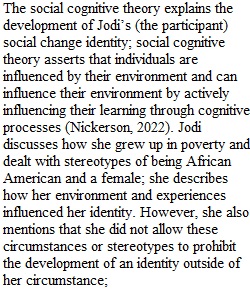


Q Overview In Modules One through Seven of this course, you will watch a series of videos from leaders within the SNHU community. The objective of these videos is to share with you some reflections and insights as they pertain to the participants’ identity, advocacy, leadership, and motivation. Watching the videos and reflecting on the content will contribute to the creation of your own social change identity. Note: As you progress through the video series and the subsequent module reflections, you will synthesize information provided from various concepts discussed within the context of the videos. Pay particular attention to specific conceptual themes that emerge from the videos. You will use the knowledge acquired in all the videos that you’ve viewed so far to complete each module reflection assignment. Prompt For this assignment, you will watch the Module One Video|SNHU Leadership and answer the following in 2 to 4 sentences per question. • Describe which theory of personal change you believe is most applicable to the development of the interview participant's social change identity. • Describe why authenticity is so critical to a leader’s ability to effect positive social change. All sources and ideas requiring attribution must be cited according to APA style. Guidelines for Submission Submit your completed Module One video reflection as a Word document, with sources cited according to APA style.
View Related Questions